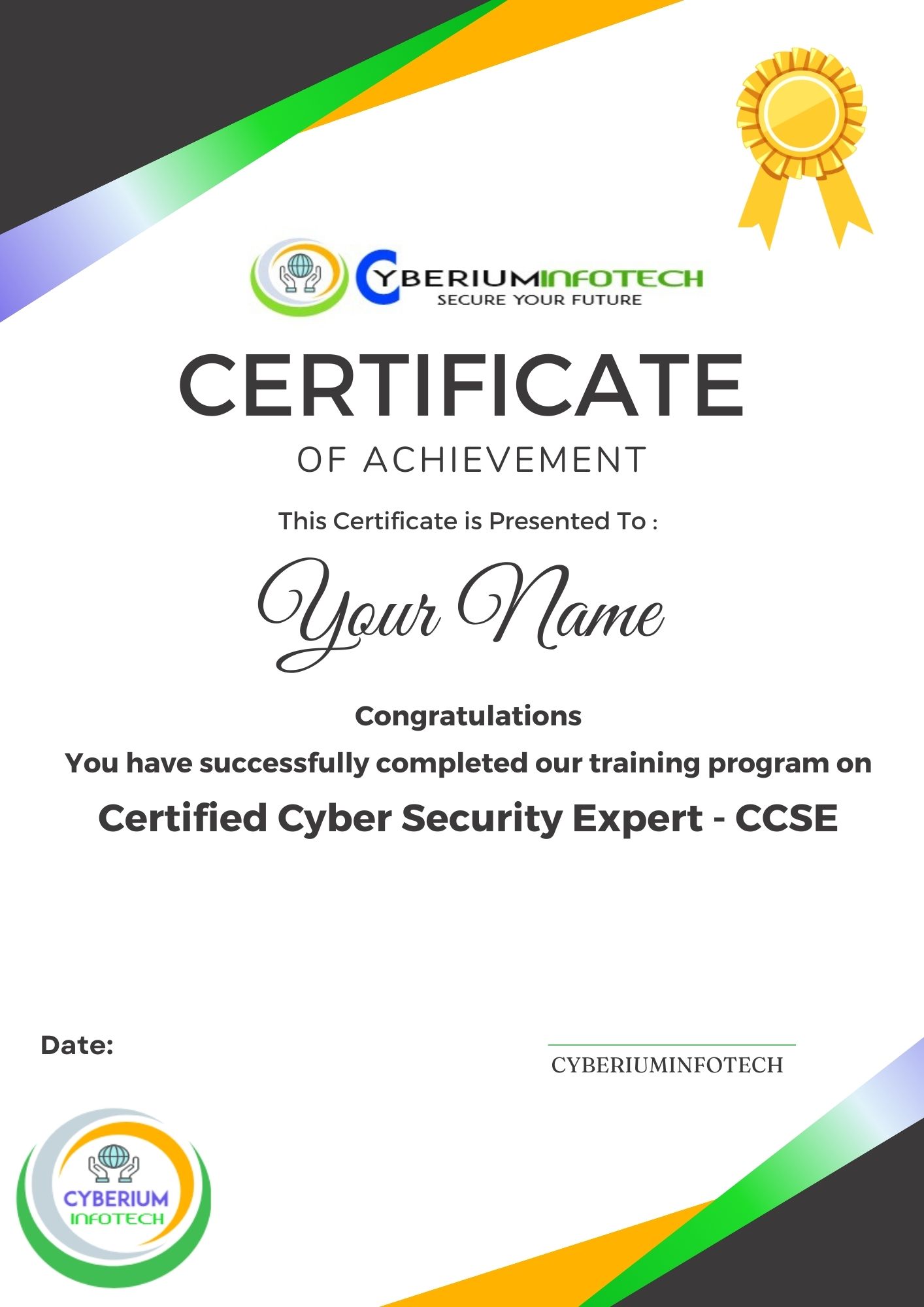Certified Cyber Security Expert
543 Ratings 787 LearnersCCSE is a certification that demonstrates your expertise in cybersecurity. It's a highly respected qualification in the industry and opens up many job opportunities. By becoming CCSE certified, you'll be equipped with the skills to secure networks, identify vulnerabilities, and protect against cyber threats. Don't miss out on this opportunity to kickstart your career in cybersecurity!
.jpg)
Certified Cyber Security Expert Overview
CCSE, or Certified Cyber Security Expert, is an industry-recognized certification that targets students and professionals interested in cybersecurity. It covers various areas of cybersecurity, such as network security, cryptography, ethical hacking, and cyber forensics. This certification equips students with practical skills, knowledge, and tools necessary to identify and mitigate cyber threats. It's a highly sought-after qualification that opens doors to many job opportunities in the cybersecurity field. Whether you're looking to advance your career or enter the exciting world of cybersecurity, CCSE is an excellent choice to help you achieve your goals.
Certified Cyber Security Expert Key Features
Industry recognition: The CCSE certification is recognized by leading cybersecurity organizations and employers globally. This provides students with an industry-standard credential that enhances their credibility and employability.
Comprehensive curriculum: The CCSE program covers a wide range of topics related to cybersecurity, including network security, cryptography, malware analysis, incident response, and more. This ensures that students gain a comprehensive understanding of the field and its practical applications.
Hands-on training: The CCSE program includes practical, hands-on training that enables students to apply their knowledge to real-world scenarios. This helps students develop practical skills that are essential in the cybersecurity industry.
Expert instructors: The CCSE program is taught by experienced cybersecurity professionals who are experts in their field. This ensures that students receive high-quality instruction and guidance throughout the program.
Flexible learning options: The CCSE program is available in a variety of formats, including in-person, online, and self-paced learning. This provides students with the flexibility to choose the learning format that best suits their needs and schedule.
Skills Covered
Network Security: Students will learn how to secure computer networks and protect them from cyber threats such as malware, phishing attacks, and hacking attempts.
Vulnerability Assessment: Students will learn how to identify vulnerabilities in computer systems and networks and develop strategies to address these vulnerabilities.
Incident Response: Students will learn how to respond to security incidents in a timely and effective manner, minimizing the impact of the incident and preventing future incidents.
Cryptography: Students will learn how to use encryption and other cryptographic techniques to secure data and communications.
Risk Management: Students will learn how to assess and manage cybersecurity risks, including the development of risk management strategies and the implementation of risk mitigation measures.
Malware Analysis: Students will learn how to analyze malware and other malicious code to understand its behavior and develop strategies to prevent and detect malware attacks.
Security Compliance: Students will learn about security standards and regulations, including the General Data Protection Regulation (GDPR) and the Payment Card Industry Data Security Standard (PCI DSS), and how to ensure compliance with these standards.
Benefits
Improved employability: The CCSE certification is recognized by leading employers in the cybersecurity industry, and attaining this credential can significantly enhance a student's employability and career prospects.
Increased earning potential: According to industry data, professionals with CCSE certification typically earn higher salaries than their non-certified counterparts, reflecting the high demand for skilled cybersecurity professionals.
Enhanced credibility: CCSE certification is a widely recognized and respected credential in the cybersecurity industry, providing students with increased credibility and professional status.
Access to new career opportunities: CCSE certification can open up new and exciting career opportunities in the cybersecurity industry, including roles such as security analyst, network security engineer, and cybersecurity consultant.
Skill development: The CCSE program is designed to equip students with a range of practical skills that are essential in the cybersecurity industry, helping them to develop their abilities and enhance their career prospects.
Networking opportunities: Students who complete the CCSE program will have the opportunity to network with other cybersecurity professionals, opening up opportunities for collaboration, learning, and career advancement.
Certified Cyber Security Expert Curriculum
Eligibility
Education: Applicants must have a bachelor's degree or higher in a relevant field, such as computer science, information technology, or cybersecurity.
Experience: Applicants must have a minimum of two years of professional experience in the field of cybersecurity, with a focus on security analysis, network security, or information security management.
Certification: Applicants must hold at least one industry-recognized cybersecurity certification, such as CompTIA Security+, Certified Ethical Hacker (CEH), or Certified Information Systems Security Professional (CISSP).
Skills: Applicants must have a strong understanding of cybersecurity principles and best practices, including network security, encryption, vulnerability assessment, incident response, and risk management.
English proficiency: Applicants must demonstrate a high level of proficiency in the English language, as the CCSE program is taught and assessed in English.
Pre-requisites
asic knowledge of computer systems: Students should have a fundamental understanding of computer systems, including hardware, software, and operating systems.
Understanding of networking concepts: Students should have a basic understanding of networking concepts, including protocols, architectures, and technologies.
Familiarity with programming languages: Students should have some experience with programming languages such as Python, Java, or C++, and be able to write simple programs.
Knowledge of cybersecurity fundamentals: Students should have a basic understanding of cybersecurity principles, including security threats, vulnerabilities, risk management, and incident response.
Experience in cybersecurity: Students should have some professional experience in the field of cybersecurity, either through previous work experience or through cybersecurity-related coursework.
Course Content
Cybersecurity Fundamentals: This module provides an overview of cybersecurity principles and best practices, including cybersecurity threats, vulnerabilities, risk management, and incident response.
Network Security: This module covers network security principles and technologies, including firewalls, intrusion detection and prevention systems (IDS/IPS), virtual private networks (VPNs), and secure network design.
Cryptography: This module covers the principles of encryption and other cryptographic techniques used in cybersecurity, including symmetric and asymmetric encryption, digital signatures, and key management.
Malware Analysis and Reverse Engineering: This module covers malware analysis and reverse engineering techniques, including static and dynamic analysis, behavioral analysis, and disassembly.
Vulnerability Assessment and Penetration Testing: This module covers the principles of vulnerability assessment and penetration testing, including vulnerability scanning, penetration testing methodologies, and reporting.
Risk Management: This module covers the principles of risk management, including risk assessment, risk mitigation strategies, and risk management frameworks.
Incident Response: This module covers the principles of incident response, including incident detection, containment, and recovery.
Compliance and Regulations: This module covers cybersecurity compliance and regulations, including the General Data Protection Regulation (GDPR) and the Payment Card Industry Data Security Standard (PCI DSS).
Certified Cyber Security Expert Exam & Certification
Q1. What is CCSE certification?
Answer: CCSE stands for Certified Cyber Security Expert, which is a professional certification designed for individuals who want to demonstrate their expertise in cybersecurity.Q2. Who can apply for CCSE certification?
Answer: Anyone who has a basic understanding of cybersecurity concepts and wants to pursue a career in cybersecurity can apply for CCSE certification.Q3. What are the eligibility criteria for CCSE certification?
Answer: To be eligible for CCSE certification, you must have a minimum of two years of experience in the cybersecurity field and hold a bachelor's degree in computer science or a related field.Q4. What is the exam format for CCSE certification?
Answer: The CCSE certification exam consists of multiple-choice questions and is conducted online.
Pages
Frequently Asked Questions
Q1. What is CCSE certification?
Answer: CCSE stands for Certified Cyber Security Expert, which is a professional certification designed for individuals who want to demonstrate their expertise in cybersecurity.Q2. Who can apply for CCSE certification?
Answer: Anyone who has a basic understanding of cybersecurity concepts and wants to pursue a career in cybersecurity can apply for CCSE certification.Q3. What are the eligibility criteria for CCSE certification?
Answer: To be eligible for CCSE certification, you must have a minimum of two years of experience in the cybersecurity field and hold a bachelor's degree in computer science or a related field.Q4. What is the exam format for CCSE certification?
Answer: The CCSE certification exam consists of multiple-choice questions and is conducted online.Q5. What topics are covered in the CCSE certification exam?
Answer: The CCSE certification exam covers a wide range of cybersecurity topics, including network security, information security, cyber law, ethical hacking, and risk management.Q6. What is the passing score for the CCSE certification exam?
Answer: The passing score for the CCSE certification exam is 70%.Q7. What are the benefits of CCSE certification?
Answer: CCSE certification can help you enhance your knowledge and skills in cybersecurity, which can lead to better job opportunities and higher salaries.Q8. How long is the CCSE certification valid?
Answer: The CCSE certification is valid for three years from the date of certification.Q9. How can I prepare for the CCSE certification exam?
Answer: You can prepare for the CCSE certification exam by studying cybersecurity concepts and taking online courses or practice exams.Q10. How long does it take to receive the CCSE certification after passing the exam?
Answer: It usually takes 4-6 weeks to receive the CCSE certification after passing the exam.Q11. Can I renew my CCSE certification after it expires?
Answer: Yes, you can renew your CCSE certification by retaking the certification exam or completing a certain number of continuing education credits.Testimonial
Placements

Shiva
Consultatnt
Hi, this is Shiva from Kerala. I did Cyber Security training from CyberiumInfotech, where I got more practical knowledge than the usual syllabuses. I was very much satisfied learning at this training institute. Especially with the way of teaching, they gave individual attention to every student and I had an outstanding experience which brought me some confidence for facing my placements. This institution has highly experienced real-time professionals working as trainers. Thanks to CyberiumInfotech.
Salary 7.5 Lakhs
Hike 60%
 Accenture
Accenture
Testimonial
Reviews

David
Sr, Consultant
Hello This is David. I did Cybersecurity and SOC combo course in Cyberiuminfotech in last month.I learnt a lot in this training.And Trainer provided me real time training and also career guidance.. Management people were also supported me in good manner.Thanks you so much.
Instructors
Expert Instructors
Related Courses
.jpg)
.jpg)
.jpg)
.jpg)

.jpg)
.jpg)
.jpg)
.jpg)
.jpg)
.jpg)
.jpg)